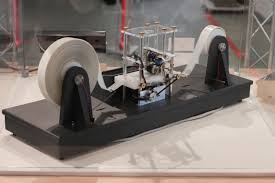Reading time
10 minutes
Home >> Blog >> Tech, politics, and power >> Is the spirit of capitalism a Turing machine?

What does the history of the Turing machine has in common with the origins of capitalism?
In this series we will explore the intimate connection between IT development and sociological analysis.
It’s fascinating how a bunch of historians and political analysts anticipated much of the current digital development.
Table of contents
Will robots enslave humans?
Scientists urge policymakers to explore the risks, brought by increasingly intelligent machines, such as mass employment – the Financial Times reports.
The good news is that digital computers will not enslave humans: that’s too late, and maybe unnecessary.
Yet, a great variety of popular media have all anticipated those scientists.
Some examples? The Protestant Ethic and the Spirit of Capitalism, by the father of sociology Max Weber, the collected works on Mechanical Intelligence, by the British logician Alan Turing, or The Matrix, the blockbuster by the Wachowski sisters.
Which is very reassuring.
It’s evolution, baby!
Max Weber’s iron cage
Weber read the early Protestant sacred documents.
And he realised that the celebration of God through a life of hard work and sacrifice did not represent a sufferance at the believers’ eyes. Because they felt a lightweight coat of faith upon their shoulders.
Evidently, the spirit of these sects, in Weber’s observation, drives the organizational forms of work of primitive capitalism
As a consequence of its economic success, this organisation starts regulating society as a whole.
“Not only those directly engaged in earning a living.” [Weber, The protestant ethic and the spirit of capitalism, p. 123].
Hence, generation after generation, a material church replace the spiritual sects.
Just do it (for God)
Generation after generation, an immaterial market replace the material church.
Most noteworthy, generation after generation, work continues to mean sacrifice.
Such a capitalistic evolution sets the spirit free of moral considerations. As a consequence, work gradually stops addressing God’s glory to start looking for self-fulfillment.
Life-achievement is morally prohibited at first, then allowed.
Finally, it becomes mandatory in what was for Weber the incipient age of (self) consumption.
Therefore, the lightweight coat – which faith had put on the believers’ shoulders – turns into an iron cage (stahlhartes Gehäuse) for the workers of the free western world.
HAVE YOU EVER HEARD OF MOBILE VIDEO MARKETING?
In a world, where everything is communication, you have to master your own means of digital production.

The Turing machine
Birth of a logical revolution
Weber believes that this automatism embodies modern life
It’s an iron cage of instructions to execute endlessly.
Not too distant from what logicians call the Halting problem.
With this in mind, Alain Turing wants to create an ‘ideal-machine based on an algorithm’ to solve the Halting problem.
Thanks to another recent blockbuster, The imitation game (Morten Tyldum, 2014), millions of people today know Alain Turing. They know he contributed to defeat Nazis with the decryption of their secrete communications.
And then was forced to suicide because of his homosexuality.
Nevertheless, millions of people still ignore that his negative solution to the Halting problem ends up inspiring the development of modern computers.
To put it another way, this negative solution is what we call a Turing machine
Stay thirsty
With the rise and fall of the British empire, the evil capitalism paves the way to computer science’s development.
Which at its turn fosters the arrival of our contemporary information society: stay foolish, stay hungry.
And if you are, by chance, part of the growing unemployed population, stay very hungry, and more and more angry.
Today, we are able to appreciate the increasing validity of Weber’s intuitions. Because the concept of men-machine, called to execute a set of instructions without interpreting them, has gone beyond Turing’s intuitions as well.
As a result, it landed on the material and social existence of computers. Which enable us to work, to have fun, to build relations.
More importantly – they make people feel free as they have never been before.
Just, free not as free speech, but as free beer.
HAVE YOU EVER BOOKED A VIDEO ONLINE?
We have created the first and most powerful automation system for online video booking.
BIRTH OF A DIGITAL CAGE
Welcome to the GIG economy
It seems like the digital world opens a white horizon of opportunities: a lightweight coat of free contents, such as this post.
However, this same digital world implies a growing competition that annihilates the economic compensation for these contents. It is an iron cage of great expectations but no one’s paying a salary to allow you to feed them.
Now, take a blue pill and answer to this question: would you pay 10 cents to read this post?
To summarise, Turing was the first one to believe in the idea of Artificial Intelligence (AI), which today seems so real that scientists get anxious.
This prophecy of digital slaves that rise and turn slavery against their exploiters, though, cannot be real.
Rather, it can only be the dessert of the real, a last sweet bite before that the boredom of reality prevails.
Red pill, blue pill?
In conclusion, machines have power, but they don’t care. Waiting for self-generative AI like they were waiting for Godot, machines calculate.
First of all, they work without questioning.
As the Protestant believers before them.
Which is precisely Weber’s definition of the spirit of capitalism.
No surprise, then, that this unintentional slavery lies upon the will of people.
“…so inured, so hopelessly dependent on the system, that they will fight to protect it.”
At least, this is how Morpheus, the most charismatic character in The Matrix, puts it.
In summary, is the spirit of capitalism a Turing machine?
Can it find a solution to the halting problem and its catastrophic consequences?
Read more
Cited works
- Weber, The protestant ethic and the spirit of capitalism (1920), Chicago-London, Fitzroy dearborn publishers, 2001.
- Turing, A.M., Collected works, Mechanical Intelligence, New York, Elsevier, 1992, vol. III (edited by Ince D.C.).
- Cappuccio, M.L., Alan Turing: l’uomo, la macchina, l’enigma, Milano, AlboVersorio, 2005.
- Stallman, R., Saggi scelti, vol I (2002), Viterbo, Nuovi equilibri, 2003.
